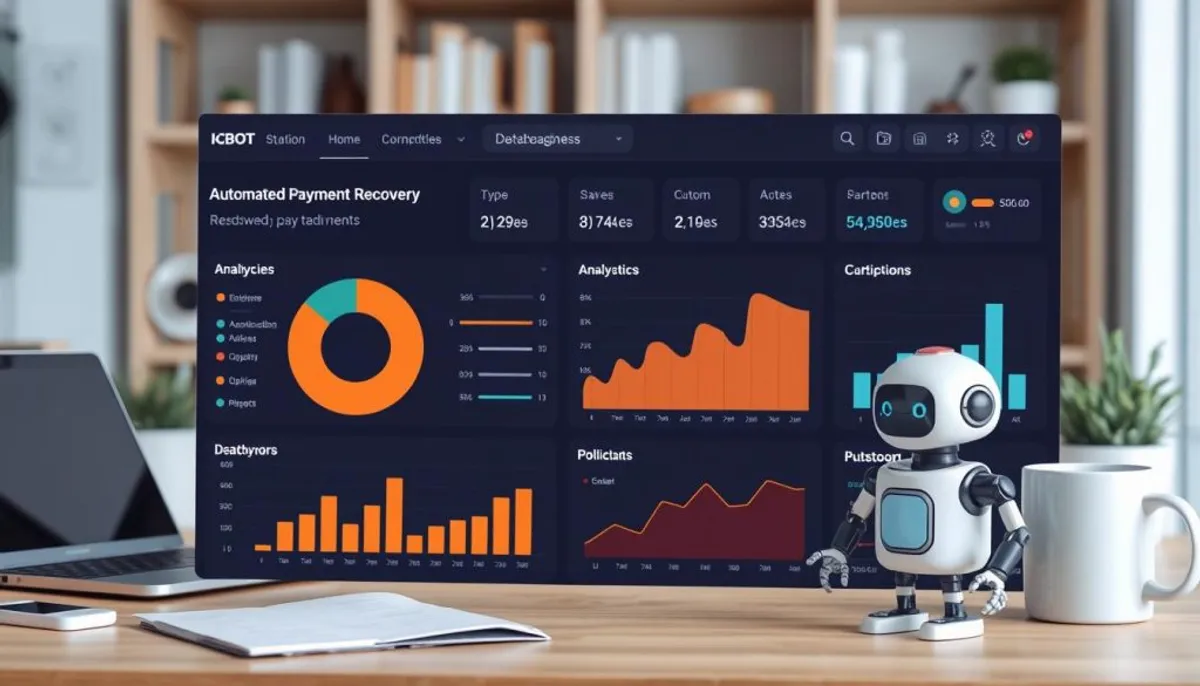Identifying the optimal debt recovery solution is pivotal for small enterprises grappling with accounts receivable management. The U.S. market is home to over 4,000 collection agencies, rendering the selection process daunting. Our meticulous analysis of more than 40 agencies has culminated in the identification of the premier choices for small business debt collection.
Our evaluation was guided by several key criteria, including industry experience, client feedback, and specialization. For example, Qade Collections emerged as the Best Debt Collection Agency of 2023, as endorsed by Expertise and Quicksprout. It caters to a diverse range of sectors, from heavy machinery leasing to software companies. American Profit Recovery, with a stellar 4.9 rating from 1,172 reviews, exemplifies their dedication to client satisfaction.

Several agencies specialize in services tailored to the unique requirements of small businesses. Premier Collection Services, LLC excels in pre-collection and debtor locating, while PSI Collect has been consecutively named the best B2B commercial collection agency. These specialized services are indispensable for effective accounts receivable management in specific sectors.
In the process of selecting a collection agency, it is essential to scrutinize their track record and industry accolades. For instance, FFGN, boasting over 80 years of experience, was celebrated at the New York Smart CEO-CPA and ESQ awards in 2015. Such achievements serve as a testament to an agency’s dependability and proficiency in debt recovery solutions.
Key Takeaways
- Over 4,000 collection agencies operate in the U.S. market
- Top agencies offer specialized services for various industries
- Client reviews and ratings are crucial in evaluating agency performance
- Industry recognition and awards can indicate an agency’s reliability
- Some agencies provide unique services like pre-collection and debtor locating
- Experience in specific industries can be beneficial for targeted debt recovery
Understanding Collection Agencies and Their Role in Business
Collection agencies are crucial for businesses aiming to recover unpaid debts. These services are vital for maintaining a healthy cash flow, crucial for small enterprises. We will examine the mechanisms behind commercial collections and the scenarios where their use is warranted.
What Collection Agencies Do
Professional collection agencies employ diverse strategies to reclaim overdue payments. They utilize skip tracing to track down debtors and may escalate to litigation when necessary. Since 2004, American Profit Recovery has specialized in resolving debts while preserving customer relationships.
When to Consider Using a Collection Agency
Small businesses face a critical juncture when accounts are 60-90 days overdue. At this point, creditors often turn to collection agencies. If initial collection efforts fail or debtors deny owing, professional intervention is imperative. It’s important to note that accounts in collections can remain on a credit report for seven years.
Impact on Business Cash Flow
Collection agencies are instrumental in enhancing a business’s cash flow by retrieving overdue payments. They enable business owners to concentrate on their core activities while debt recovery is handled by experts. For example, American Profit Recovery’s APRweb portal allows small business owners to manage their debt collections 24/7, boosting efficiency and cash flow management.
By engaging with commercial collections services, businesses can ensure financial stability and focus on growth rather than debt collection. Early intervention with professional services can significantly bolster your business’s financial health.
Best Collection Agencies for Small Businesses
Small businesses often face challenges in managing delinquent accounts. Identifying a suitable third-party collections agency is crucial for effective bad debt management. We will examine some leading collection agencies tailored for small enterprises.
Summit Account Resolution
Summit Account Resolution is distinguished by its transparent pricing and minimal collection balance requirements. This feature makes it an ideal option for small businesses handling diverse debt amounts.
Prestige Services Inc.
Prestige Services Inc. specializes in B2B collections. They offer negotiable rates and volume discounts, which are advantageous for small businesses with numerous outstanding accounts.
Rocket Receivables
Rocket Receivables is a cost-effective choice for businesses. They provide flat-rate plans and tiered services, allowing small businesses to select a plan that aligns with their budget and collection requirements.
IC System
IC System has been assisting small businesses since 1938. They offer two service levels for B2C collections: a low-cost Recovery Plus program and a comprehensive Premier Collect Plan. Their online debt collection tools aim to enhance efficiency and revenue.
| Agency | Specialization | Notable Feature |
|---|---|---|
| Summit Account Resolution | General | Low minimum balance |
| Prestige Services Inc. | B2B | Volume discounts |
| Rocket Receivables | General | Tiered services |
| IC System | B2C | Online tools |
These agencies boast successful debt recovery records across various sectors. When selecting a collection agency, consider pricing, specialization, and technological offerings to ensure the best match for your small business.
Collection Agency Pricing Models and Fee Structures
Small businesses frequently face challenges with unpaid invoices, which can severely impact their cash flow and operational efficiency. Professional debt recovery solutions provide a vital lifeline. Yet, understanding the pricing models is essential for making informed decisions.
Collection agencies predominantly employ contingency-based pricing for accounts receivable management. This model stipulates that they only receive compensation if they successfully recover the debt. The fees typically span from 25% to 50% of the collected amount, with variations depending on the debt’s age and complexity.
Some agencies, on the other hand, offer fixed-fee options for commercial collections services. This flat-rate approach is advantageous for debts that are easier to collect, offering small businesses a degree of cost predictability. It is imperative to negotiate fees before entering into any contracts, with particular attention to larger debts.
| Pricing Model | Description | Typical Fee Range |
|---|---|---|
| Contingency | Percentage of recovered amount | 25% – 50% |
| Fixed Fee | Flat rate regardless of collection success | $50 – $500 |
| Tiered Pricing | Rates vary based on debt age or amount | 20% – 60% |
In selecting a collection agency, it is crucial to consider their success rates and specialized services. Agencies with high recovery rates may charge premium fees, reflecting their expertise in debt recovery solutions. Carefully evaluate the potential return on investment to ensure the chosen pricing model meets your business needs.
ti3: A Modern Alternative to Traditional Collection Agencies
Small businesses frequently encounter challenges with delinquent account recovery. Traditional professional collection agencies can be prohibitively expensive and may jeopardize client relationships. ti3 emerges as a groundbreaking SaaS platform, aimed at simplifying small business debt collection processes.
Automated Payment Recovery System
ti3’s automated system proactively sends timely reminders to overdue customers, addressing a pervasive issue in the business world. With 49% of invoices in the US becoming overdue, an efficient automated system is indispensable. It can notably decrease the 14 hours weekly that 65% of businesses dedicate to payment collection tasks.

Client Relationship Preservation
Unlike traditional collection agencies, ti3 prioritizes preserving positive client relationships. This is crucial, as 89% of SMBs indicate that late payments impede growth. Employing a more diplomatic strategy, businesses can reclaim funds without estranging customers.
Cost-Effective Solutions
ti3 presents a budget-friendly alternative to engaging a professional collection agency. With 60% of SMBs facing cash flow constraints due to late payments, cost-effective delinquent account recovery solutions are imperative. The ti3 platform significantly shortens the average payment time from over 30 days with manual processing to just 14 days.
| Metric | Traditional Methods | ti3 Platform |
|---|---|---|
| Average Payment Time | 30+ days | 14 days |
| Weekly Time Spent on Collections | 14 hours | Significantly reduced |
| Client Relationship Impact | Potentially negative | Preserved |
Evaluating Collection Agency Success Rates
When selecting a collection agency for your small business, it’s essential to understand their success rates. Leading agencies in third-party collections consistently outperform the industry average. This makes them invaluable partners for managing bad debt collections.
Industry Average Recovery Rates
Typically, debt collection agencies achieve recovery rates between 20% and 25%. Notably, agencies like Summit Account Resolution excel with a 34.8% recovery rate. In some cases, they have achieved an impressive 80% recovery. Prestige Services Inc. (PSI) also stands out with a 38% recovery rate, highlighting the effectiveness of their debt recovery solutions.
Performance Metrics to Consider
Assessing a collection agency’s effectiveness requires more than just recovery rates. Important metrics include:
- Time to collect
- Customer satisfaction scores
- Compliance with regulations
- Total amount recovered
For example, Rocket Receivables boasts a recovery rate four times the industry average. They have collected over $6 billion in the last decade. When evaluating agencies, it’s crucial to request detailed performance reports. This allows you to assess their track record in your specific industry.
| Agency | Recovery Rate | Notable Achievement |
|---|---|---|
| Summit Account Resolution | 34.8% | Up to 80% in certain cases |
| Prestige Services Inc. | 38% | Consistently above average |
| Rocket Receivables | Not specified | $6 billion collected in 10 years |
Legal Compliance and Industry Regulations
In the domain of accounts receivable management, professional collection agencies face a labyrinth of legal mandates. The Fair Debt Collection Practices Act (FDCPA) serves as the foundational regulation. It delineates stringent guidelines for commercial collections, fostering ethical conduct and safeguarding both creditors and debtors.
Adherence to regulations transcends mere compliance; it embodies the industry’s integrity. Agencies must hold licenses and bonds in the jurisdictions they operate within. This measure enhances the security of businesses engaging debt recovery services.
The Telephone Consumer Protection Act (TCPA) is pivotal in governing communication modalities. Non-compliance can incur substantial penalties, ranging from $500 to $1,500 per infraction. A landmark 2019 legal verdict underscored the imperative for agencies to adhere rigorously to communication standards.
Recent enactments have further delineated the terrain of debt collection:
- Regulation F limits voice call frequency and sets rules for electronic communications
- The Fair Credit Reporting Act oversees credit information handling
- State laws often mirror or expand upon federal regulations
When selecting a collection agency, scrutinizing their compliance history is imperative. Inquire about their protocols for upholding legal and ethical standards. A reputable agency in accounts receivable management will prioritize compliance, ensuring your business adheres to legal frameworks while pursuing debt recovery.
Specialized Collection Services by Industry
Collection agencies frequently customize their offerings for specific industries, enhancing success in small business debt collection. This specialization enables more effective delinquent account recovery across diverse sectors.
B2B Collections
Business-to-business collections necessitate a distinct methodology. Miller, Ross & Goldman stands out in this realm, having successfully recovered hundreds of millions for small businesses over three decades. Their Construction Industry team, with over 100 years of collective experience, ensures clients receive payment.
B2C Collections
Consumer-focused collections necessitate a distinct strategy. American Profit Recovery, celebrating 20 years in operation, employs diplomatic tactics in third-party collections. They offer a cost-effective system that enhances collection efforts while maintaining client relationships.
Industry-Specific Solutions
Many agencies provide specialized services for particular sectors:
- Heavy Equipment Rental: Miller, Ross & Goldman offers nationwide services.
- Oil & Gas: Successful recovery of unpaid invoices.
- Commercial Software & SaaS: Over 25 years of experience in invoice recovery.
- Medical Services: Dramatic growth in client base over two decades.
- Chemical Industry: Recognized for effective A/R recovery solutions.
These specialized approaches often yield higher recovery rates due to deep understanding of sector challenges and regulations. When selecting a collection agency, prioritize their expertise in your industry for optimal results in small business debt collection.
Technology and Digital Solutions in Debt Collection
The debt collection industry is undergoing a transformation, driven by cutting-edge technology. The U.S. market is expected to reach $16.7 billion by 2025. Agencies are now using digital tools to streamline accounts receivable management and enhance recovery rates.
Debt collection software has emerged as a crucial tool for small businesses. These platforms automate essential functions, significantly improving the collection process’s efficiency. For example, Experian’s software facilitates debtor location, report generation, credit risk assessment, and debt management automation.

- Simplicity Collect provides plans ranging from $79 to $1,188 monthly
- Anytime Collect offers features like online statements and CRM integration
- InterProse ACE includes virtual agent support and automated communications
- Cogent specializes in tools for the legal industry
- Beyond ARM offers comprehensive accounts receivable management services
Autonomous finance tools, powered by AI and data analytics, are significantly boosting debt collection efficiency. These advancements, combined with digital wallet options like PayPal and Google Pay, are reshaping payment methods and increasing recovery rates.
By embracing these technological advancements, collection agencies can deliver more effective and efficient services. This helps businesses recover outstanding debts and maintain healthy cash flows.
Choosing the Right Collection Agency for Your Business
Choosing a professional collection agency is vital for maintaining a healthy cash flow in your small business. With thousands of agencies in the United States, finding the right one can be daunting. This guide aims to assist you in navigating the selection process and making an informed decision.
Essential Selection Criteria
When evaluating commercial collections services, consider these key factors:
- Industry experience and specialization
- Recovery rates and performance metrics
- Pricing structure and fee transparency
- Licensing and compliance with state regulations
- Technology offerings for account tracking
- Value-added services like training programs
Red Flags to Watch For
Be wary of collection agencies that exhibit these warning signs:
- Upfront fees or unrealistic promises
- Lack of proper licensing or insurance
- Poor communication or limited reporting
- Unethical or aggressive collection practices
- Negative reviews or low Better Business Bureau ratings
Documentation Requirements
Prepare these documents when engaging a collection agency:
- Detailed invoices and account statements
- Contracts or agreements with debtors
- Records of communication attempts
- Any relevant legal documents
| Criteria | Importance | Impact on Recovery |
|---|---|---|
| Industry Experience | High | Better compliance, higher recovery rates |
| Technology | Medium | Improved tracking and reporting |
| Pricing Structure | High | Affects overall return on investment |
| Licensing | Critical | Ensures legal compliance and credibility |
Collection Agency Communication Methods
Collection agencies utilize diverse communication strategies for delinquent account recovery. These tactics aim to strike a balance between efficacy and respect for debtors. Common methods include phone calls, emails, letters, and text messages in third-party collections.
Leading agencies focus on diplomatic communication to preserve client relationships. Many provide multilingual services to address language barriers in bad debt collections. It is imperative that all interactions adhere to Fair Debt Collection Practices Act (FDCPA) regulations.
Let’s examine the performance of some prominent agencies:
| Agency | Rating | Customer Complaints (3 years) |
|---|---|---|
| American Profit Recovery | 4.9/5 | Not Available |
| Altus Receivables Management | A+ (BBB) | 34 |
| IC System | A (BBB) | 1718 |
| Fair Capital | A+ (BBB) | 4 |
Agencies such as The Kaplan Group achieve an 85% success rate on large viable claims. This underscores the significance of selecting the appropriate agency for your business requirements. Effective communication is paramount in successful delinquent account recovery.
Timeline and Expectations for Debt Recovery
Grasping the timeline and expectations for debt recovery is essential for effective accounts receivable management. Commercial collections services adhere to a structured process, with defined windows for optimal recovery. This structured approach is critical for successful debt recovery.
Optimal Collection Windows
The most opportune time for debt recovery is within 120 days of an account becoming past due. This period is pivotal for implementing effective debt recovery solutions. Agencies often provide tiered services, acknowledging that older debts are more challenging to collect.
Recovery Process Stages
The debt recovery process encompasses several stages:
- Initial contact with the debtor
- Negotiation of payment terms
- Establishment of payment arrangements
- Legal action, if necessary
Leading agencies strive to settle claims within 45 days, highlighting the efficiency of their accounts receivable management strategies. It is vital to establish realistic expectations based on the debt’s age and type.
| Debt Age | Recovery Rate | Recommended Action |
|---|---|---|
| 0-30 days | 90-95% | In-house collection efforts |
| 31-90 days | 70-80% | Early intervention by collection agency |
| 91-180 days | 50-60% | Aggressive collection strategies |
| 181+ days | 20-30% | Consider legal action or debt sale |
By comprehending these timelines and expectations, businesses can make informed decisions regarding when to engage commercial collections services. This knowledge is crucial for maintaining healthy cash flow and minimizing financial losses.
Conclusion
Choosing the appropriate professional collection agency is crucial for small businesses to sustain a robust cash flow. Agencies like Summit Account Resolution and Prestige Services Inc. deliver customized solutions for managing small business debt. Their expertise can notably elevate delinquent account recovery rates, surpassing what in-house efforts can achieve.
In selecting an agency, it’s essential to evaluate pricing models, industry experience, and adherence to regulations like the CFPB’s Regulation F. Modern options, such as ti3, offer automated, cost-effective solutions that protect client relationships while recovering funds. Outsourcing to a collection agency not only saves time but also diminishes legal risks and enhances negotiation outcomes.
The future of debt collection is promising, with advancements in AI, data analytics, and communication platforms. These innovations aim to streamline the process and improve customer satisfaction. By collaborating with a reputable agency, small businesses can harness these technologies. This ensures timely debt recovery and allows them to concentrate on their core activities.
RelatedRelated articles



